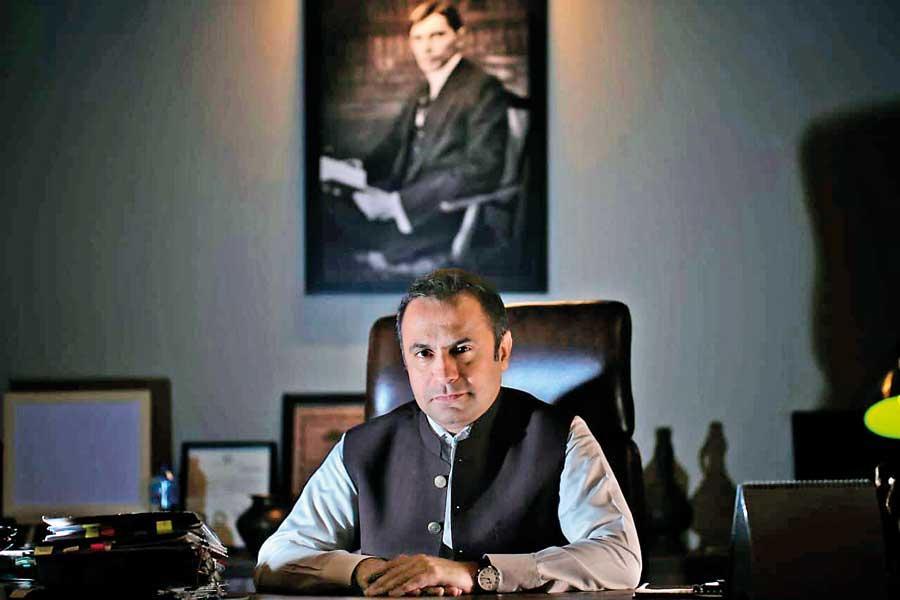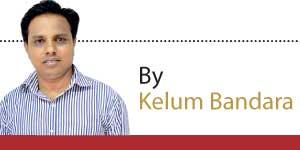23 Oct 2023 - {{hitsCtrl.values.hits}}

Renowned Pakistani Archaeologist Dr. Abdul Samad who was in Sri Lanka in recent times to deliver a lecture on the Buddhist heritage in his country shared his views with Daily Mirror on his latest findings during excavation. Dr. Samad is the director – Directorate of Archaeology and Museums, Khyber Pakhtunkhwa, Pakistan. He is a highly accomplished Presidential Civil Award-Winning professional archaeologist from Pakistan with extensive academic and professional credentials. He holds a Ph.D. from the Free University Berlin, Germany, and completed a Fulbright post-doctorate at the University of Wisconsin, USA. With two decades of experience, he has made exceptional contributions to archaeology through thirty successful projects.
Daily Mirror on his latest findings during excavation. Dr. Samad is the director – Directorate of Archaeology and Museums, Khyber Pakhtunkhwa, Pakistan. He is a highly accomplished Presidential Civil Award-Winning professional archaeologist from Pakistan with extensive academic and professional credentials. He holds a Ph.D. from the Free University Berlin, Germany, and completed a Fulbright post-doctorate at the University of Wisconsin, USA. With two decades of experience, he has made exceptional contributions to archaeology through thirty successful projects.
 Q Pakistan is a Muslim country. It is confronting extremism as well. But still you devote a lot of resources to protect these Buddhist archaeological sites. How challenging is it for you in that case?
Q Pakistan is a Muslim country. It is confronting extremism as well. But still you devote a lot of resources to protect these Buddhist archaeological sites. How challenging is it for you in that case?
It’s absolutely not challenging at all because, in Pakistan, people believe this is their cultural heritage. Regardless of any religion or culture, this is our cultural heritage. It is our shared responsibility to protect the rich cultural heritage and then highlight to the world the real image of Pakistan. As you said in your question, unfortunately there are news items regarding extremism and all these things, but nobody is highlighting the real image of Pakistan which is the custodian of multiculturalism, the custodian of rich cultural heritage.
That’s why we are here to tell people of Sri Lanka that Pakistan is an absolutely safe country for different religions. You have seen through videos and photographs all the heritage sites.
These are well protected, well preserved and the government of Pakistan, being a Muslim majority country, is spending money to protect the other religious sites in Pakistan.
Q Actually, what is unique about findings in recent times?
For me, being an archaeologist, every discovery is unique, because these are my words. Every stone in Gandhara tells you a story. First, Bhamala archaeological site. This is a Buddhist establishment site, where I have discovered by myself the 48-feet long Mahaparinirvana Buddha, declining Buddha. This is the longest and oldest so far that we have discovered.
According to C14 dates (Carbon-14), it belongs to 2nd century AD. Now, we are doing some conservation work to restore this declining Buddha.
Another important discovery is the Buddhist archaeological excavation at Bahudhira in Sawabi, also in Swat Valley. So, there are different discoveries.
There is another site. It’s called Barikot, Bahudhira, with the help of Italian Archaeological Commission, we have discovered one of the oldest Buddhist remains, which last year was mentioned as top 10 most important discoveries in the world. These are from Pakistan. It’s a rich cultural heritage we are sharing with other countries - Buddhist countries, because Buddhism started, reached its climax - especially the Mahayana Buddhism, the early Buddhism - that started from Gandhara, from Khyber Pakhtunkhwa province of Pakistan.
Q During your excavations, did you find anything unique to establish any ancient linkages between Pakistan and Sri Lanka?
Especially with the arrival of this Faxian, he has visited both Sri Lanka and Pakistan. Yes, I mean, mostly the sites that I have excavated, already mentioned by Faxian, and he was the Chinese traveller in 4th century AD. He mentioned all these archaeological sites that I have discovered, that I have excavated. So, these are the common things.
But unfortunately, if you see the old Buddhist architecture, the Buddhist art, the earliest art, which is influenced from Gandhara, there are missing links. Nobody in Sri Lanka or Pakistan does not know about these shared influences. So, I think, people to people exchange programmes, especially the media, can play a vital role to educate people in Pakistan and Sri Lanka and other parts of the world, that our relation is not just 70 years old, but 2000 years old - the relations that we have to see through different ways.
Q Now, the Sri Lankan cultural affairs minister suggested something like the formation of a kind of a heritage forum that is for exchange of archaeologists between the two sides. How receptive are you to that idea?
Well, this is wonderful. After that, I thank the minister already for approving this idea, because, in Pakistan, we have very good Buddhist archaeology. We have very professional archaeologists in Pakistan, who are internationally renowned for archaeological excavation of Buddhist sites and monasteries and Buddhist studies. So, we can, I mean, transfer this knowledge here in Sri Lanka.
I was told there are many Buddhist important sites, which still need to be excavated and properly interpreted and properly linked. So, we can do it.
On the other hand, Sri Lanka can help us, educate us, about the tourism model you have in your country, because in Pakistan, this is lacking. We have a lot of natural resources, we have beautiful natural and heritage resources,but we are unable to exploit all these resources for tourism purposes. On the other hand, Sri Lanka is very good, one of the leading in this region,who knows how to promote tourism in this area. So, we wanted to learn the Sri Lankan model to implement in Pakistan for heritage tourism, especially religious tourism.
On the other hand, our scientists, archaeologists, they can come here and train Sri Lankan archaeologists, and do archaeology here in Sri Lanka,and do some conservation work as well.
Q Can you share some information about the uniqueness of Taxila, about the concentration of Buddhist relics and all?
Well, there are two things. If you go to Strickwoods, Gandhara is the modern Khyber Pakhtunkhwa province,which is Peshawar, Mardan, Swabi, all these areas. And Taxila in ancient time was a different country, which was a seat of learning. In ancient times, many people from royal families, they would come to Taxila to be educated in Buddhist sutras. Like Panini, who is the great teacher of Sanskrit,who introduced the Sanskrit grammar, he was from Gandhara and he was teaching at Taxila Valley. Chanakya, he was from Taxila Valley. So, Taxila was the main centre of learning at that time.
And Taxila’s uniqueness is that it was known as a Taxila in ancient time. Plus, Taxila is the crossroad of civilization.
Earlier, it was believed that many influences went from west to east. But with the passage of research, we are finding evidence that all these influences went from East towards West, which include art and architecture, civilization, teaching, medicines and so many things.
Q You mentioned about this heritage tourism or religious tourism. But actually, these archaeological items related to Buddhism, are objects of veneration for Sri Lankan Buddhists. But for a non-Buddhist country like Pakistan, these may be mere objects of archaeological value. So, actually, how do you reconcile those two aspects?
True, absolutely true. In Pakistan, these are not objects for worship, because it is a Muslim-dominated society. But, as I said, we are the proud custodians. We respect the other religions.
And we are very much proud that such civilizations are flourishing in this part of the world. And we are the proud custodians. We are the protectors. We are spending money on this.
So, we are welcoming all religious faiths and venerating their holy places. Like, we Muslims go to Khan-e-Kaaba, to Saudi Arabia. And we do worship there and freely visit our holy places.
So, everybody is welcome to Pakistan to visit their holy places. And the government of Pakistan, they have already shown their willingness. They have already provided all the facilities, including securities and everything.
Q If you talk about the whole lifetime activities of the Buddha, what is your view or analysis about his activities in the territory presently coming under Pakistan?
Well, one of the earliest Buddhism started in the modern-day Pakistan. Like, you see the Heenayana form and Mahayana. The famous form of Buddhism, also started from Gandhara. We have the evidences. These are early sets of Buddhism.
And then we have Tantric Buddhism, which is the modern Tibetan Buddhism. That is again something which started from Swat, from ancient Udhyana. So, all these places in Gandhara are the melting pot of different cultures.
Including Hinduism, Buddhism, and different sects of Buddhism. And we have evidences in literature, in Buddhist literature.
And we have also archaeological remains, tangible evidences.
Q How do you think these Buddhist heritage sites spread not only in Pakistan, but in other territories including nearby Afghanistan?
I have been recently assigned some duties as an advisor for Afghan government on Buddhist heritage sites.
So, I visited Afghanistan’s site called MesAynek. I have visited that site. As for the current government Taliban, they are very much interested in protecting Buddhist sites and promoting Buddhism. So, they are totally different to the Talibans from the 2001.
Q Did you get any chance to observe the current status of these Buddhist statues that were demolished or damaged?
Yeah, they are still doing conservation work. And Taliban, they are supervising this conservation work. And they are asking different donors, international donors to come and help them. So, these are different Talibans from what they were 20 years back.
Q What is your role in that case?
I was their advisor for MesAynek Buddhist site. There is a site MesAynek, a very famous site. So, I was invited to that site by the Taliban, by this government,to suggest them how to protect and preserve that site. And I saw them very much active and sensitive about other religious sites.They do not want to repeat mistakes that were done 20 years ago .
02 May 2024 1 hours ago
02 May 2024 2 hours ago
02 May 2024 4 hours ago
01 May 2024 01 May 2024
01 May 2024 01 May 2024